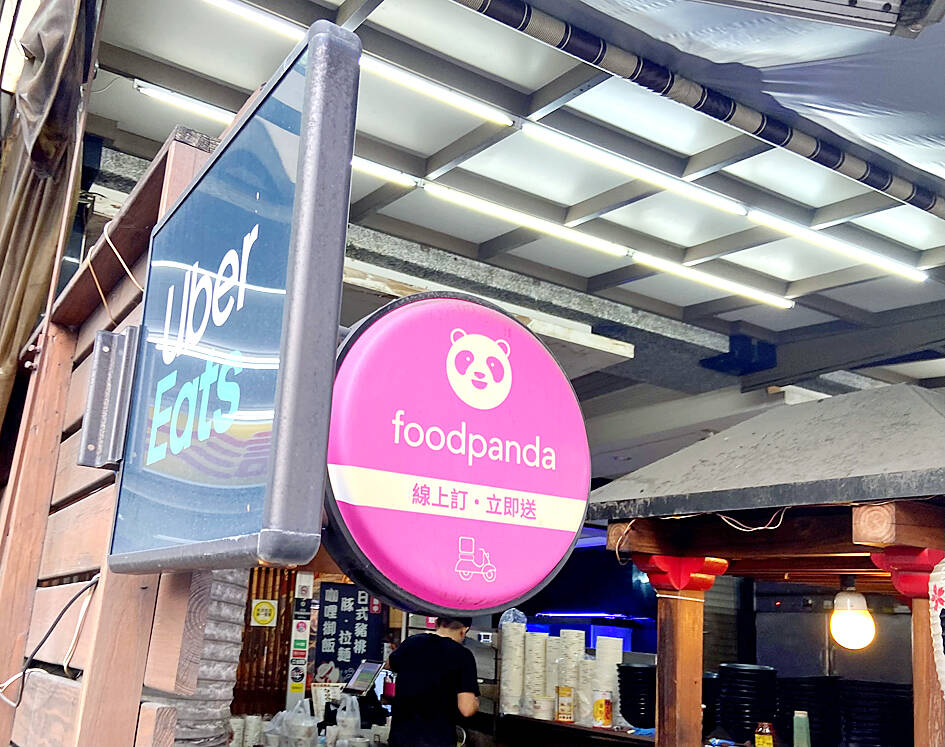The Fair Trade Commission (FTC) is to examine the impact of food delivery platform Uber Eats’ planned acquisition of Delivery Hero’s Foodpanda on market competition, particularly on changes in market share, the commission’s chair said on Thursday.
The FTC would primarily assess potential market share by analyzing the revenue, credit card receipts and number of deals of the domestic delivery platform giants, FTC Chair Lee May (李鎂) said after the agreement was announced.
Delivery Hero and Uber Eats have reached an agreement to sell its Foodpanda business in Taiwan to the latter for US$950 million, with the deal subject to regulatory approval, the company said on Tuesday last week.

Photo: CNA
“We will measure, with its major rival gone, the potential impact on [Uber Eats’] ability to [arbitrarily] raise prices, to work with other business operators [to pose a threat to market fairness] ... and to prevent other potential competitors from joining the market,” Lee said.
However, the result would not wholly hinge on whether the FTC regards Uber Eats as a monopolistic enterprise in the event of a successful merger, given that a monopoly can benefit the market under certain circumstances, the commission said.
The commission “holds a neutral attitude toward monopolistic structures” and would try to prevent a monopolistic enterprise from capitalizing on its market status rather than from coming into existence, FTC officials said.
It would also take into consideration the rights of those affected by the deal, such as restaurant operators and food delivery drivers, and hold public hearings to collect diverse opinions.
“We will then assess whether the overall economic pros brought by the merger outweigh the cons that come with limiting market competition before we make a final decision,” Lee added.
The FTC received Uber Eats’ acquisition request on Tuesday last week and is checking whether all necessary documents have been submitted before reviewing the merger, Lee said.
The case would be reviewed within 30 to 90 weekdays once the review starts, in accordance with the Fair Trade Act, he said
If the deal is passed, Uber Eats could have a market share of more than 80 percent in Taiwan, data compiled by the FTC in 2020 showed, which the commission pledged to re-examine.
The National Delivery Industrial Union hopes that Uber Eats would also take over the 140,000 delivery drivers hired by Foodpanda should the merger be approved, but no promises have been made, union advisor Su Po-hao (蘇柏豪) told the media on Tuesday last week.
Even if that wish is fulfilled, the deal might still leave local delivery drivers at the mercy of their new employer, as both companies have cut wages over the past few years, Su said.
Foodpanda and Uber Eats are far ahead of other competitors in terms of popularity in Taiwan.
A survey released in February by the Market Intelligence & Consulting Institute found that 73.6 percent of customers preferred foodpanda, 57.6 percent chose Uber Eats and no other competitor reached 10 percent.

TAKING STOCK: A Taiwanese cookware firm in Vietnam urged customers to assess inventory or place orders early so shipments can reach the US while tariffs are paused Taiwanese businesses in Vietnam are exploring alternatives after the White House imposed a 46 percent import duty on Vietnamese goods, following US President Donald Trump’s announcement of “reciprocal” tariffs on the US’ trading partners. Lo Shih-liang (羅世良), chairman of Brico Industry Co (裕茂工業), a Taiwanese company that manufactures cast iron cookware and stove components in Vietnam, said that more than 40 percent of his business was tied to the US market, describing the constant US policy shifts as an emotional roller coaster. “I work during the day and stay up all night watching the news. I’ve been following US news until 3am

UNCERTAINTY: Innolux activated a stringent supply chain management mechanism, as it did during the COVID-19 pandemic, to ensure optimal inventory levels for customers Flat-panel display makers AUO Corp (友達) and Innolux Corp (群創) yesterday said that about 12 to 20 percent of their display business is at risk of potential US tariffs and that they would relocate production or shipment destinations to mitigate the levies’ effects. US tariffs would have a direct impact of US$200 million on AUO’s revenue, company chairman Paul Peng (彭雙浪) told reporters on the sidelines of the Touch Taiwan trade show in Taipei yesterday. That would make up about 12 percent of the company’s overall revenue. To cope with the tariff uncertainty, AUO plans to allocate its production to manufacturing facilities in

Six years ago, LVMH’s billionaire CEO Bernard Arnault and US President Donald Trump cut the blue ribbon on a factory in rural Texas that would make designer handbags for Louis Vuitton, one of the world’s best-known luxury brands. However, since the high-profile opening, the factory has faced a host of problems limiting production, 11 former Louis Vuitton employees said. The site has consistently ranked among the worst-performing for Louis Vuitton globally, “significantly” underperforming other facilities, said three former Louis Vuitton workers and a senior industry source, who cited internal rankings shared with staff. The plant’s problems — which have not

TARIFF CONCERNS: The chipmaker cited global uncertainty from US tariffs and a weakening economic outlook, but said its Singapore expansion remains on track Vanguard International Semiconductor Corp (世界先進), a foundry service provider specializing in producing power management and display driver chips, yesterday withdrew its full-year revenue projection of moderate growth for this year, as escalating US tariff tensions raised uncertainty and concern about a potential economic recession. The Hsinchu-based chipmaker in February said revenues this year would grow mildly from last year based on improving supply chain inventory levels and market demand. At the time, it also anticipated gradual quarter revenue growth. However, the US’ sweeping tariff policy has upended the industry’s supply chains and weakened economic prospects for the world economy, it said. “Now